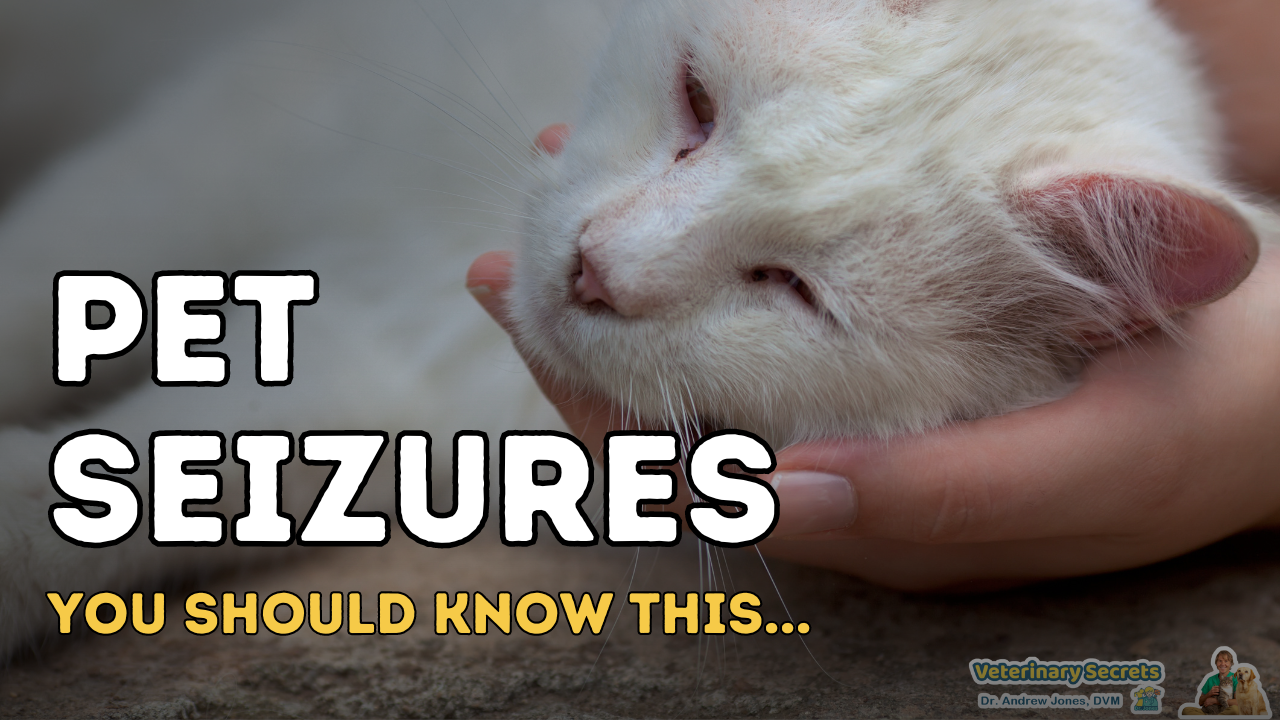Dog/cat with seizures? you should know this…

Seizure disorders in our dogs, especially epilepsy, appear to be on the rise.
Are there things that you can do to help prevent this?
Well no one knows for sure, and clearly a combination of genetics/environment is playing a big key.
CBD or Cannabidiol which now has been shown to be a VERY promising alternative treatment with studies happening at Colorado State University.
We do have a natural, whole plant extract CBD tincture for Dogs and Cats 10% OFF here:
Dr Jones’ Ultimate CBD for Dogs and Cats

Michael (brother) has an epileptic dog named Angus who has not had ANY seizures in the last 2 years while on CBD!

Seizures In Dogs: 7 Natural Remedies
If your dog has epilepsy, then you really should be looking at some of the alternative remedies for treating seizures. Conventional treatment typically consists of 2 veterinary drugs, Phenobarbital and Potassium bromide, which both have numerous side effects. This article will cover the types of seizures in dogs, causes, and the most important natural remedies.
What is Pet Seizure
A seizure is defined as abnormal muscle activity, as a result of uncontrolled messages from the brain. There is a sudden, brief change in how your dog’s brain is working. When the brain cells are not working properly, your dog has the physical changes called a seizure.
Dog seizures are classified as either grand mal seizures, or localized. Grand mal seizures affect your dog’s entire body. Generally the legs are extended and paddling and the head is rigid and extended. They may go through cycles of being stiff then relaxed. Some dogs may lose bowel/bladder control, and if the seizure occurs at night, this is all you may see in the morning. Localized seizures affect only certain areas of your dog’s body. Typically you may see their head shake or their jaw chatter.
In the majority of cases the cause of the seizure is unknown, and it is then called epilepsy. Some of the other possible causes include: cancer (i.e. brain tumor), infections, brain trauma, poisoning, low blood sugar, hypothyroidism. Your veterinarian can discuss a variety of diagnostic tests such as blood work, x-rays, CT scan, MRI, Spinal fluid tap.
The age at which the seizure starts will give you a fairly good idea as to the underlying cause. For pets less than 1 year old, most are caused by brain infections (i.e. meningitis); some dogs though will develop epilepsy as puppies. For pets between the ages of 1-5, the most common diagnosis and seizure cause is epilepsy. If your pet has his first seizure over the age of 5, the most common cause is a brain tumor.
ATKINS DIET
There are reports that show a link between diet and seizures in dogs. One human study showed a marked reduction in seizure activity with patients on the Atkins diet. Every seizuring pet should at least try a commercial hypoallergenic diet for 12 weeks. Most alternative practitioners are strongly advising a holistic diet, naturally preserved, free of grains, and primarily animal protein. Purina has a newish anti-seizure diet which is primarily PROTEIN and FAT… especially MCT Oil… … Angus is on a Atkins Diet
MCT OIL
A diet rich in medium-chain triglycerides (MCT) can help to control seizures in dogs with idiopathic epilepsy when used as an adjunct to veterinary therapy. The research has been used by Nestlé Purina in the development of a commercial diet to help nutritionally manage dogs with idiopathic epilepsy.
- There is no standard MCT oil dose, but extrapolated from people it would be 1 teaspoon/10lbs twice daily.
- Start with 1/2 that amount as it can lead to diarrhea, and work your way up.
- Many adults are taking upwards of 4 tablespoons/twice per day.
Medical Marijuana- Primarily CBD oil: Cannabidiol or CBD
CBD has an important role in the future of medicine. CBD is a primary component of the cannabis plant. It is non-psychoactive, which means that it doesn’t produce the “high" commonly associated with marijuana.
CBD is currently used by many patients (human and animal) who seek an alternative form of therapy without the unwanted side effects of typical drugs.
Compelling research has shown that CBD may inhibit both seizure activity and the severity of such activity [1] and [2]. Study results have “point[ed] to CBD being of potential therapeutic use…in the treatment of epilepsies."[3] Studies also indicate that the use of CBD in conjunction with certain anti-seizure medications may enhance the anticonvulsant effects of those drugs.[3] Furthermore, studies indicate chronic use of CBD has not been shown to elicit negative side effects and does not induce tolerance.[4]
CBD dose for animals with seizures:
- Start at standard dose of 3mg/10lbs twice daily.
- You can safely give upwards of 5 times this if your dog is not responding.
Acupressure
There is one acupressure point that can be particularly helpful. GV26 is the most important one, as it can help stop a seizure. It is where the nose meets the upper lip (immediately below the nostrils). This is a key one for CPR, as it can trigger your pet to breathe, and for seizures. Hold the point for 1 minute during a seizure.
Essential Fatty Acids
Essential Fatty Acids may potentially decrease brain inflammation. Here you want to have high doses and therapeutic levels of the the EFA’s; the dose being 1000mg per 10lbs of body weight daily. I would suggest using Krill oil as it has a higher % of the anti-inflammatory EFA’s, and may better cross the blood brain barrier.Dr Jones’ ULTIMATE Omega 3 for Dogs and Cats Krill dose of 500mg/20lbs daily.

Cholineis
Cholineis used for certain human nerve disorders; it helps make a nerve chemical called acetylcholine. A specific choline product that can help seizures in dogs is called Cholidin. It can be given with conventional medication, at a dose of 1-2 pills daily for a small dog, and 2-4 pills given daily for a large dog.
Magnesium
There are case reports of seizures being controlled with magnesium supplementation in people with specific conditions, and recently in an open randomized trial, children with infantile spasms responded better to adrenocorticotropic hormone (ACTH) plus magnesium than to ACTH alone. (Angus is also on Magnesium)
A study on Magnesium: ‘We hypothesize that magnesium supplementation can reduce seizures in people with epilepsy.’
This hypothesis can be tested in a controlled randomized supplementation trial. If proven, magnesium supplementation needs to be considered in the overall management of people with refractory epilepsy.
Magnesium is inexpensive, safe to give at appropriate doses.
It is used for people as a sleep aid… .so can calm your hyperactive dog.
It is also used as a laxative at higher doses… .so start slowly.
Here are some suggested doses:
Magnesium citrate and glycinate. Powder is easiest.
- Doses: 1-2mg/lb once-twice daily.
There is a Magnesium citrate powder at 150mg/teaspoon
- 0 to 10 kg 1/8 teaspoon once-twice/per day
- 10 to 20 kg 1/4 teaspoon once/twice per day
- 20 to 40 kg 1/2 teaspoon once/twice per day
- Above 40kg 1 teaspoon once/twice daily

Gonna try these seizures remedies
Yes and we have kot more tips for you:
https://veterinarysecrets.com/?s=seizure
Dr. Jones is a GODSEND!!! My dog is almost 16 and just had his first seizure. I have him on ALL of Dr. Jones stuff and I believe that’s why he does as good as he does. I used to supplements separately until I found Dr. Jones. I realize it’s important where items are sourced from and I immediately switched over. I get better supplements and it’s less expensive!!!!
I love all the products. I love the videos and swear by them and I just love Dr. Jones. He’s good people!!!!!!
THANK YOU DR. JONES!!! I bought my two girls a full supply of each item for their dogs for Christmas! 🙂